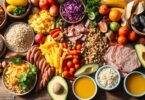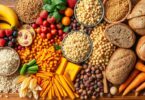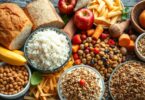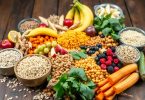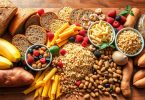“Carbohydrates are the body’s preferred source of energy, powering our every move.” – Dr. Michael Greger, author and nutrition expert.
In today’s fast-paced world, maintaining consistent energy levels is crucial for productivity, focus, and overall well-being. The key lies in strategic consumption of carbohydrate-rich foods. These foods provide a steady supply of fuel for both body and mind. This article explores the best carbohydrate sources to keep you energized and ready to tackle your daily tasks.
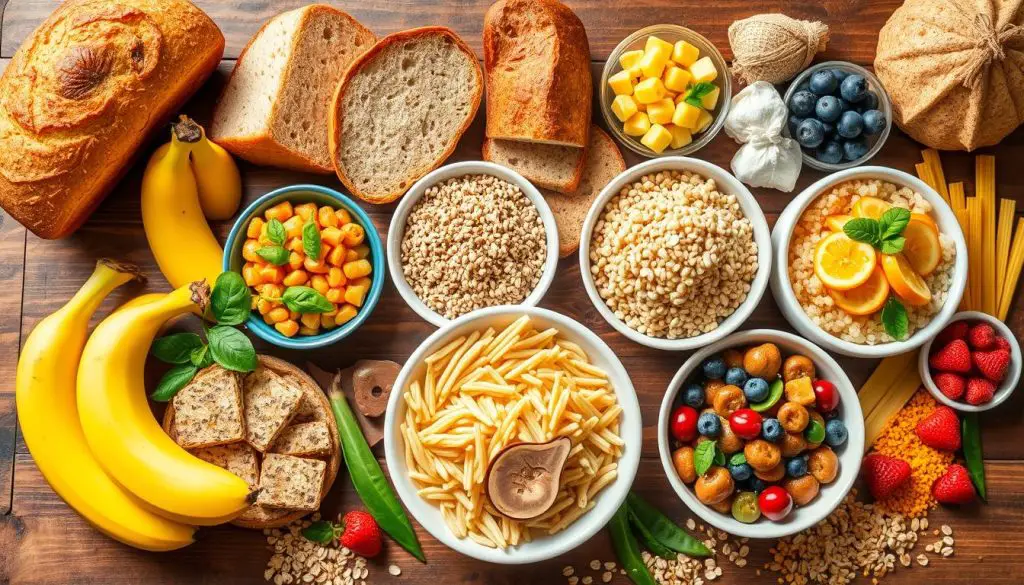
Key Takeaways
- Carbohydrates are the body’s primary source of energy, fueling our daily activities.
- Whole, complex carbohydrates provide sustained energy release, while simple carbs offer a quick energy boost.
- Incorporating a variety of carbohydrate-rich foods, such as whole grains, starchy vegetables, and legumes, can help maintain consistent energy levels.
- Timing your carbohydrate intake, especially around workouts and meals, can optimize energy utilization.
- Choosing the right carbohydrate sources and balancing them with other macronutrients is essential for a well-rounded, energy-boosting diet.
Understanding the Role of Carbohydrates in Energy Production
Carbohydrates, known as complex carbs or energy-rich carbohydrates, are vital for our body’s energy needs. They serve as the primary fuel for both physical and mental tasks. This makes them essential for maintaining carbs for mental energy throughout the day.
The Science Behind Carb-to-Energy Conversion
Consuming carbohydrates leads to their breakdown into glucose, a simple sugar. This glucose is then absorbed and used as energy. This process, called carb-to-energy conversion, is fundamental. The glucose is transported to cells, where it’s converted into adenosine triphosphate (ATP). ATP is the cell’s primary energy source.
Different Types of Carbohydrates and Their Energy Impact
- Complex carbs, like whole grains, legumes, and starchy vegetables, are digested and absorbed more slowly. They provide sustained energy.
- Simple carbs, such as refined sugars and syrups, are quickly broken down. They cause a rapid energy spike followed by a crash.
Why Your Body Needs Carbs for Fuel
Carbohydrates are crucial for our body’s functioning. They fuel our muscles for physical activity and our brain for mental tasks. Without enough carbohydrates for energy, our body may struggle. This can lead to fatigue, decreased mental clarity, and impaired overall health.
Whole Grains: The Foundation of Sustained Energy
Whole grains are pivotal in maintaining consistent energy levels throughout the day. They are a rich source of complex carbohydrates, which gradually release glucose into the bloodstream. This prevents the mid-afternoon energy crash.
These grains are not only a treasure trove of nutrients but also a powerhouse for energy. They contain fiber, B vitamins, and minerals like magnesium and iron. These elements collectively support your body’s energy production, enabling you to navigate your day with vigor.
The realm of whole grains is vast, offering a variety of energy-boosting options. From the hearty oats and nutty quinoa to the wholesome brown rice and earthy farro, there’s a wealth of complex carbs for energy to explore. Integrating these energy-boosting grains into your meals and snacks is a simple yet effective strategy to maintain high and consistent energy levels.
| Whole Grain | Nutritional Benefits | Energy-Boosting Potential |
|---|---|---|
| Oats | High in fiber, protein, and B vitamins | Provides steady, long-lasting energy |
| Quinoa | Rich in protein, fiber, and essential minerals | Helps maintain energy levels throughout the day |
| Brown Rice | Packed with complex carbs, magnesium, and B vitamins | Fuels the body with sustained energy |
| Farro | High in fiber, protein, and a variety of vitamins and minerals | Supports long-term energy and endurance |
By establishing whole grains as the cornerstone of your diet, you can ensure a steady flow of energy-boosting grains. This will empower you to stay energized and focused throughout the day. Harness the energy of whole grains for energy and elevate your productivity and performance to unprecedented levels.
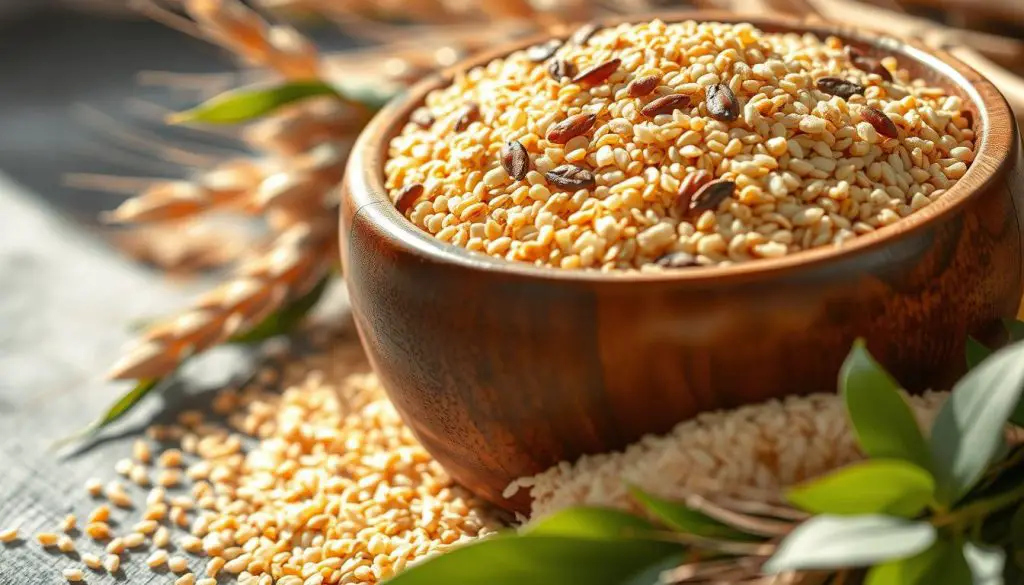
Complex Carbs vs. Simple Carbs: Making the Right Choice
Carbohydrates are not all the same when it comes to energy. Complex carbs and simple carbs have different roles in health and energy. Knowing the differences can guide you in choosing the right carbs for sustained energy.
Benefits of Complex Carbohydrates
Complex carbs, or low-glycemic carbs, are key for sustained energy. They are found in whole grains, beans, lentils, and starchy vegetables. These carbs are digested slowly, releasing glucose gradually into the bloodstream. This steady release helps maintain stable blood sugar levels, avoiding energy crashes seen with simple carbs.
When to Consume Simple Carbohydrates
Simple carbs, or high-glycemic carbs, have their uses. Found in fruits, juices, and sweets, they provide quick energy. This is useful before workouts or when needing a fast energy boost. Yet, it’s crucial to consume them in moderation to avoid blood sugar spikes and crashes.
Glycemic Index Explained
The glycemic index (GI) helps understand how carbs affect blood sugar. Low GI foods, like complex carbs, are digested slowly. High GI foods, or simple carbs, raise blood sugar quickly. Opting for low-glycemic carbs for energy is better for stable energy and health.
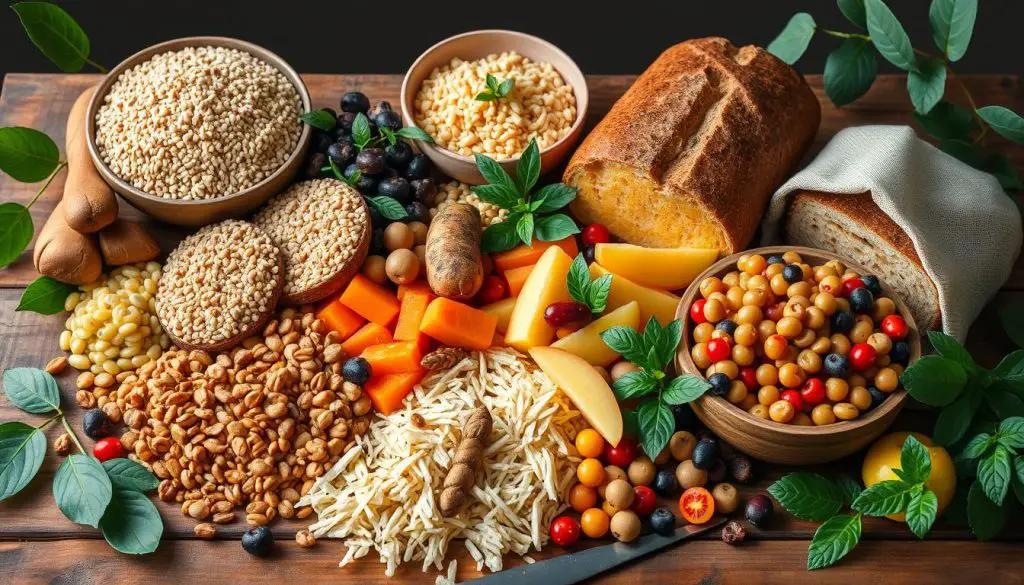
“Incorporating a balance of complex and simple carbs in your diet can help you fuel your body with the right energy at the right time.”
Top Carbohydrate-Rich Foods for Maximum Energy
Fueling your body with the right carbohydrate-rich foods is essential for boosting energy levels and sustaining physical and mental performance. From whole grains to starchy vegetables, a diverse array of nutrient-dense options can provide the carbohydrates your body needs to function at its best. Let’s explore some of the top carbohydrate-rich foods that can help you maximize your energy throughout the day.
Whole Grain Powerhouses
Whole grains, such as oats, brown rice, and quinoa, are excellent sources of complex carbohydrates that provide sustained energy. These nutrient-dense foods are rich in fiber, which helps to regulate blood sugar levels and keep you feeling full and satisfied for longer periods.
- Oats: A versatile whole grain that can be enjoyed in various forms, from overnight oats to oatmeal, providing a steady supply of energy-boosting carbohydrates.
- Brown Rice: This whole grain alternative to white rice is packed with complex carbs, fiber, and essential vitamins and minerals.
- Quinoa: A gluten-free grain that is a complete protein, containing all nine essential amino acids, as well as complex carbohydrates for long-lasting energy.
Starchy Vegetable Superstars
Starchy vegetables, such as sweet potatoes, potatoes, and squash, are rich in complex carbohydrates that can provide a steady stream of energy to fuel your day.
| Vegetable | Carbohydrate Content (per 100g) | Additional Benefits |
|---|---|---|
| Sweet Potatoes | 20.1g | High in vitamin A, a powerful antioxidant that supports immune function and eye health. |
| Potatoes | 17.5g | A good source of potassium, which is essential for muscle function and heart health. |
| Squash | 11.7g | Offers a variety of nutrients, including vitamin C and fiber, which aid digestion and gut health. |
Incorporating these starchy vegetables into your diet can provide a steady supply of energy-rich carbohydrates to fuel your active lifestyle.

Remember, the key to maximizing energy from carbohydrate-rich foods is to focus on complex carbs, which take longer to digest and provide a more sustained energy release. By making these nutrient-dense choices, you can power your body and mind throughout the day.
Starchy Vegetables: Natural Energy Powerhouses
Starchy vegetables are renowned for their high carbohydrate content, providing a sustained energy supply. These foods are rich in complex carbs, vitamins, minerals, and fiber. Including them in your diet can energize your body and maintain energy levels all day.
Best Cooking Methods for Starchy Vegetables
Opting for the right cooking methods is key to maximizing the nutritional value of starchy vegetables. Steaming, roasting, or baking are ideal, as they preserve fiber and nutrients. Overcooking should be avoided to prevent nutrient loss and texture degradation. Enhance flavors with herbs and spices, avoiding sauces and oils that add calories.
Portion Control Guidelines
- Practicing portion control is essential with starchy vegetables. Aim for a 1/2 cup cooked serving size for most adults.
- Active individuals or those with higher energy needs can increase their serving to 3/4 or 1 cup.
- Starchy vegetables should be part of a balanced diet, complemented by proteins, healthy fats, and other carbs.
Including the appropriate amount of starchy vegetables in your meals and snacks can boost your energy. This supports your overall health and well-being.
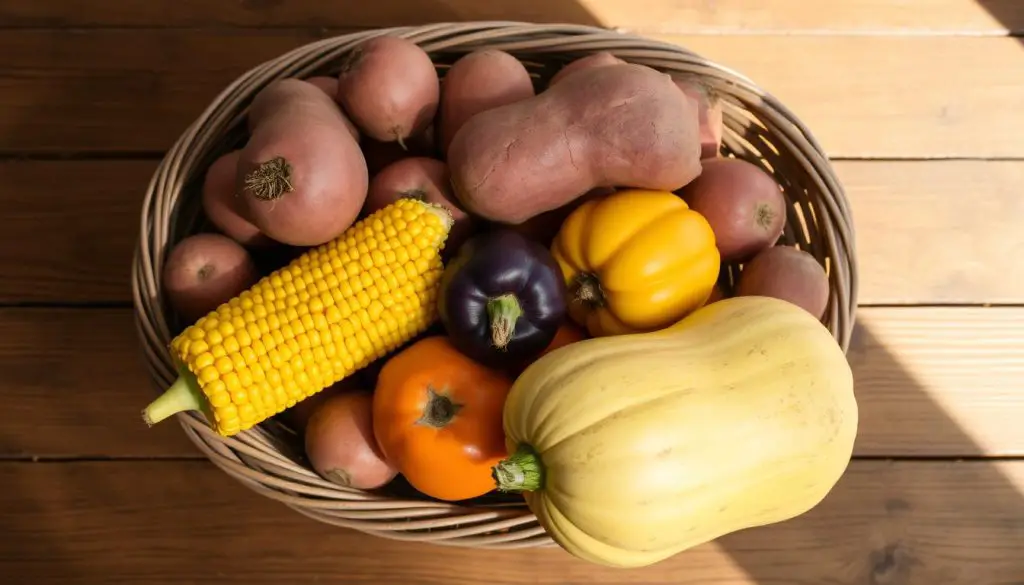
Energy-Boosting Fruits and Their Optimal Consumption Times
Fruits are an excellent choice for natural energy, offering a rich mix of carbohydrates, vitamins, minerals, and antioxidants. These nutrients contribute to feeling energized and alert throughout the day.
Exploring the best energy-boosting fruits and their ideal consumption times reveals their maximum benefits:
- Bananas – A top pick for a quick natural energy boost. Enjoy a banana before your morning workout or as an afternoon snack to combat fatigue.
- Oranges – Rich in vitamin C and complex carbohydrates, oranges offer a steady energy-fueling nutrient supply. Opt for an orange as a mid-morning pick-me-up or as part of a balanced lunch.
- Apples – A fantastic source of natural energy, apples are crisp and refreshing. Enjoy an apple as a satisfying snack or pair it with nut butter for a more substantial energy-boosting treat.
- Blueberries – These tiny powerhouses are bursting with antioxidants and carbohydrates, helping combat fatigue and improve mental focus. Enjoy a handful of blueberries as a post-lunch or pre-workout snack.
Incorporating these and other energy-boosting fruits into your daily routine can provide a natural and sustained energy boost. Timing your fruit consumption wisely ensures you maximize the benefits of these natural energy foods.
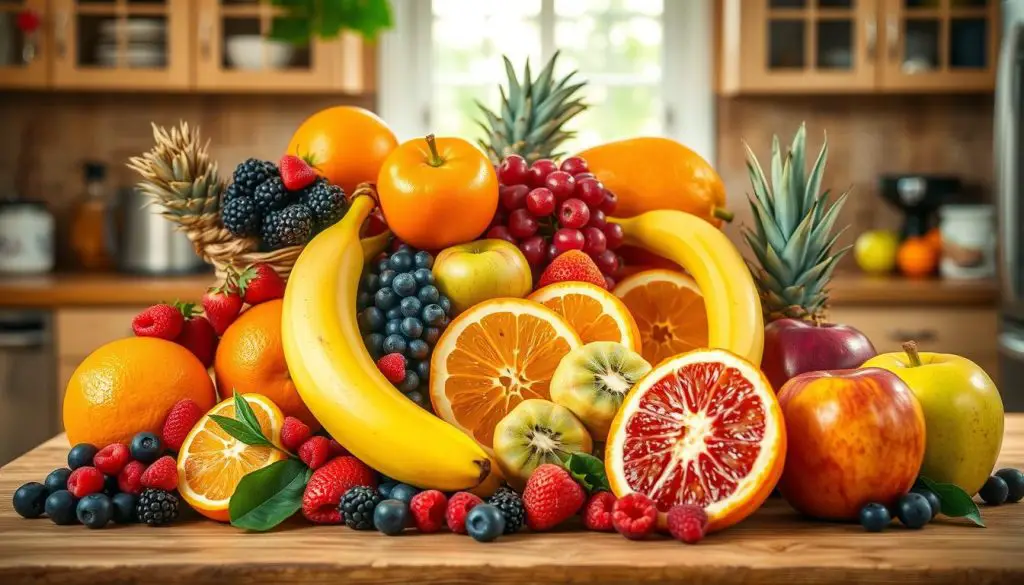
“Fruits are nature’s way of providing us with the perfect blend of carbohydrates, vitamins, and minerals to fuel our bodies and minds.”
Legumes and Pulses: Sustainable Energy Sources
Legumes and pulses, including beans, lentils, and peas, are rich in nutrients and offer sustained energy. These foods are high in fiber and low in fat, making them ideal for those seeking a sustainable energy source. Their complex carbohydrates provide a steady flow of energy throughout the day.
Protein-Carb Combination Benefits
The combination of complex carbohydrates and protein in legumes and pulses offers significant advantages. This duo slows digestion, releasing energy gradually. This prolonged energy release keeps you fueled for longer periods. Moreover, the protein in these foods aids in muscle building and repair, enhancing your body’s energy production.
Best Ways to Prepare Legumes
- Soak dried legumes overnight to improve digestibility and nutrient absorption.
- Cook legumes with spices and herbs to enhance their flavor and nutritional profile.
- Experiment with different preparation methods, such as roasting or baking, to add variety to your legume dishes.
- Combine legumes with whole grains, such as quinoa or brown rice, for a balanced and energy-boosting meal.
Incorporating legumes and pulses into your diet can provide sustainable energy throughout the day. These high-fiber carb foods are a valuable addition to any meal plan.
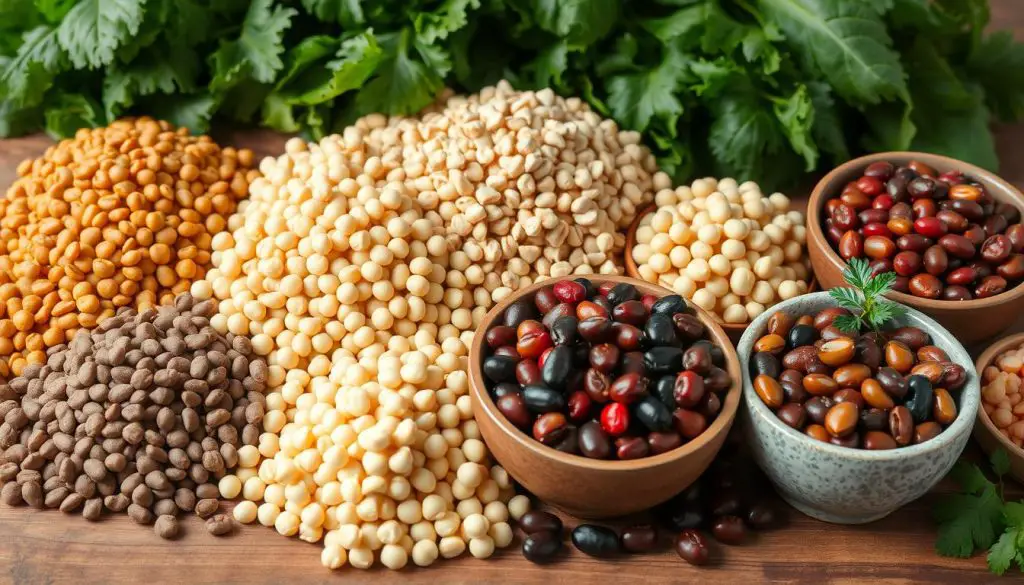
Pre-Workout Carbohydrate Options
Fueling your body with the right carbs for workout energy is crucial for maximizing your exercise performance and endurance. Whether you’re hitting the gym, going for a jog, or engaging in any other physical activity, consuming energy-boosting snacks and quick energy boost foods before your workout can provide the necessary foods for quick energy to power through your routine.
Here are some excellent pre-workout carbohydrate options to consider:
- Oatmeal: A hearty bowl of oats provides complex carbs that are slowly digested, offering sustained energy throughout your workout.
- Whole-grain toast with nut butter: The combination of whole grains and healthy fats from nut butter creates a balanced energy-boosting snack.
- Banana: This natural quick energy boost food is packed with simple carbs that can provide a quick energy surge before your workout.
- Greek yogurt with berries: The protein-carb combination in this snack can fuel your body and support muscle recovery.
- Brown rice cakes with hummus: The complex carbs in the rice cakes and the protein-rich hummus make for a satisfying pre-workout option.
Timing is key when it comes to pre-workout carbohydrate consumption. Aim to consume your energy-boosting snack about 30-60 minutes before your workout for optimal energy levels and performance.
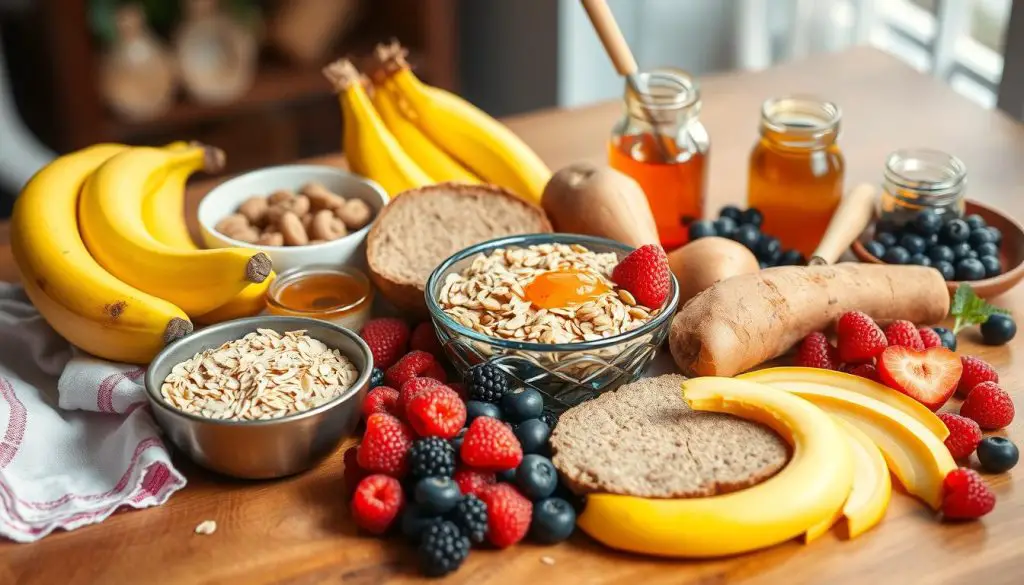
“Fueling your body with the right carbohydrates before a workout can make all the difference in your energy levels and overall performance.”
Post-Exercise Recovery Carbs
Following an intense workout, your body seeks carbohydrates to replenish energy stores. The timing of post-workout carb intake is critical for optimal muscle recovery and maintaining energy levels high.
Timing Your Post-Workout Carbs
The optimal window for refueling with carbohydrate-rich foods is within the first 30 minutes post-workout. This period is when muscles are most receptive to absorbing and utilizing these energy-giving foods. Consuming a mix of carbohydrates and proteins during this time aids in initiating the recovery process.
Combining Carbs with Proteins
- Pairing carbohydrate-rich foods with protein-rich foods enhances the body’s glycogen replenishment and muscle tissue rebuilding.
- Excellent post-workout options include a banana with Greek yogurt, a whole-grain bagel with peanut butter, or a smoothie with berries, milk, and whey protein.
- The ideal ratio of carbs to proteins for post-exercise recovery is typically 3:1 or 4:1.
Replenishing your body with the correct balance of carbohydrates for energy and proteins for muscle repair is essential for a swift recovery. It also ensures high energy levels for your next workout.
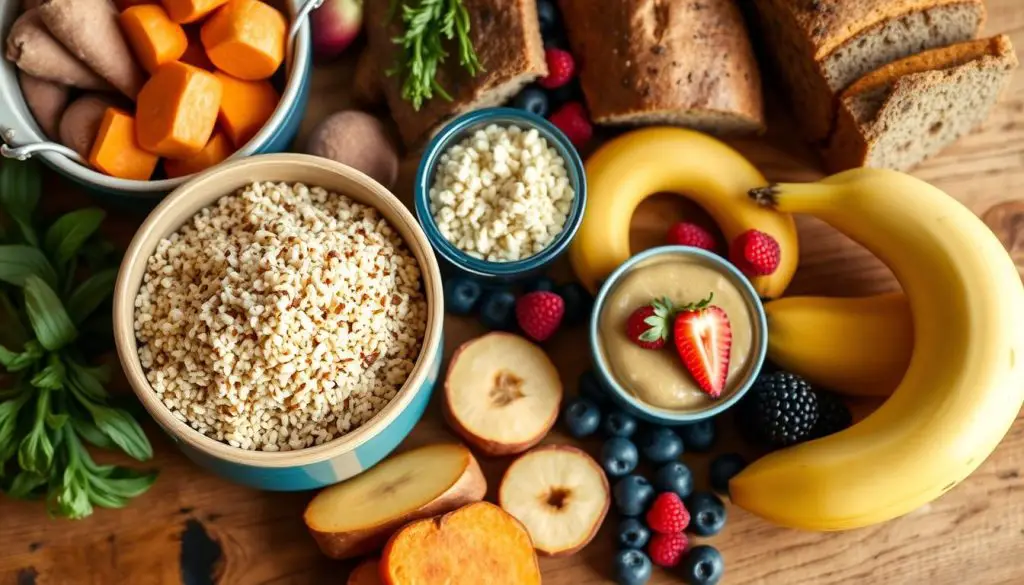
Morning Energy Boost: Breakfast Carbohydrates
Initiating your day with the appropriate high-carb breakfast foods is essential for energizing your morning activities. Carbohydrates are pivotal in energizing the body, and selecting the best carbs for morning energy ensures sustained vitality. This approach aids in maintaining energy levels throughout the morning.
Consider a bowl of oatmeal as a prime energy-boosting meal. Oats, being a complex carbohydrate, gradually release energy, ensuring prolonged satiety and vigor. Enhance your oatmeal with berries, nuts, and honey for an extra nutritional and flavor enhancement.
- Whole grain toast with peanut butter and sliced banana
- Greek yogurt with granola and fresh fruit
- Quinoa breakfast bowl with roasted vegetables and a fried egg
Integrating high-carb breakfast foods into your morning regimen is vital for day-long energy. Opt for complex carbohydrates that gradually release energy, unlike simple sugars which can cause energy spikes and crashes.
| Breakfast Carbohydrate | Energy Benefits | Serving Size |
|---|---|---|
| Oatmeal | Slow-release energy, fiber-rich | 1/2 cup dry oats |
| Whole grain toast | Sustained energy, B-vitamins | 2 slices |
| Greek yogurt with granola | Protein and carb combination, gut health benefits | 1 cup yogurt, 1/2 cup granola |
By integrating these best carbs for morning energy into your breakfast, you set the stage for a productive and energized day. A well-balanced, carb-rich breakfast serves as the cornerstone for ongoing energy-boosting meals throughout the day.

Healthy Carb-Rich Snacks for Sustained Energy
Maintaining energy levels is essential for efficiently completing daily tasks. Incorporating healthy, carbohydrate-rich snacks into your diet is a strategic approach. These energy-boosting snacks offer an immediate energy surge and sustain it for longer periods.
Quick Energy Boost Options
For a rapid energy boost, opt for snacks like fresh fruit, whole grain crackers, or a handful of nuts. These healthy carb snacks are convenient and rich in nutrients, providing an immediate energy lift.
- Banana with almond butter
- Greek yogurt with berries
- Whole wheat toast with avocado
Make-Ahead Snack Ideas
On busy days, prepare carb-rich snacks in advance. These foods that boost stamina can be stored and enjoyed throughout the week, ensuring a steady energy supply.
- Trail mix with dried fruit and nuts
- Homemade energy bars with oats, nut butter, and dark chocolate
- Roasted chickpeas or edamame
For sustained energy, balance complex carbohydrates, protein, and healthy fats in your snacks. By integrating these best carb-rich snacks into your daily routine, you’ll maintain optimal energy levels and feel your best all day.
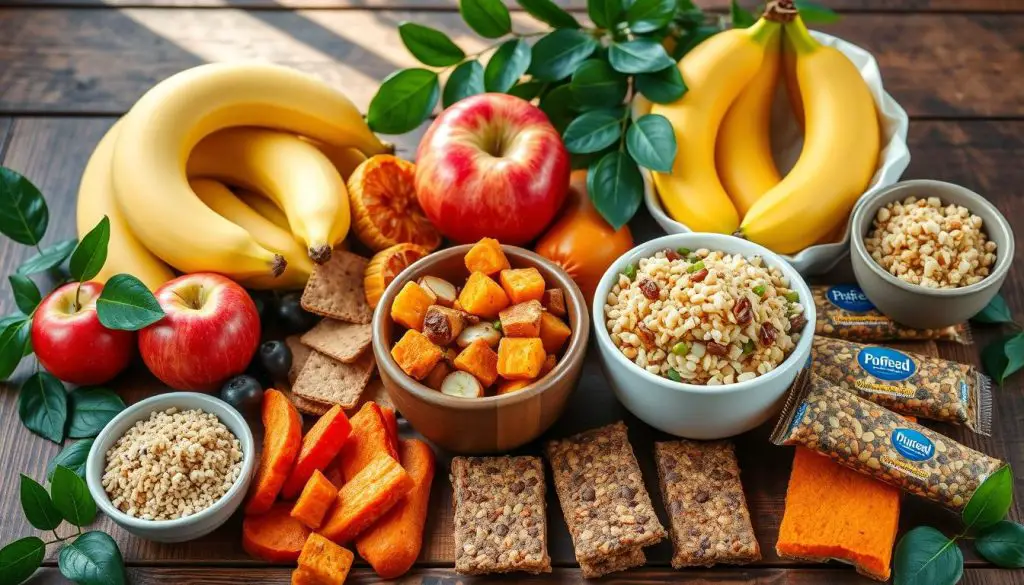
Plant-Based Sources of Energy-Rich Carbohydrates
Plant-based carbohydrates are a sustainable and nutritious way to boost energy. These whole foods are rich in complex carbs, fiber, and vitamins and minerals. They help prevent fatigue and sustain energy throughout the day. Options like whole grains, legumes, and starchy vegetables offer sustained energy without the crash of refined sugars.
Quinoa, oats, brown rice, lentils, chickpeas, sweet potatoes, and green peas are top choices. These foods are not only high in carbs but also offer digestion benefits, better blood sugar control, and a stronger immune system. By focusing on these whole foods, you can provide your body with the steady energy it needs.
Incorporating more plant-based carbs into your diet can significantly improve your energy levels. Whether you’re an athlete or someone looking to stay energized all day, these foods are a game-changer. They support your energy needs from breakfast to post-workout recovery, preventing the afternoon slump caused by processed carbs.
FAQ
What are the best carbohydrate-rich foods for an energy boost?
Whole grains, starchy vegetables, legumes, fruits, and honey are top picks for boosting energy. These complex carbs offer sustained energy and are rich in nutrients.
How do carbohydrates contribute to energy production in the body?
Carbohydrates serve as the body’s primary fuel source. They break down into glucose, which cells use to produce ATP, the body’s energy currency. This process fuels both physical and mental activities.
Why are whole grains an important foundation for sustained energy?
Whole grains, like oats, brown rice, and whole wheat, are rich in complex carbs. They provide sustained energy, as the body absorbs them slowly, leading to steady energy levels all day.
What are the differences between complex and simple carbohydrates, and when should they be consumed?
Complex carbs, found in whole grains, legumes, and starchy vegetables, are digested slowly, offering gradual energy release. Simple carbs, like those in sugary foods, are quickly absorbed, causing rapid energy spikes followed by crashes. Complex carbs are best for sustained energy, while simple carbs offer quick boosts, like before a workout.
What are some of the top carbohydrate-rich foods that can provide maximum energy?
Top energy-boosting foods include oats, quinoa, sweet potatoes, bananas, berries, lentils, and brown rice. These foods offer a mix of complex carbs, fiber, and essential vitamins and minerals for sustained energy.
How can starchy vegetables be incorporated into an energy-boosting diet?
Starchy vegetables like potatoes, corn, and peas are rich in complex carbs. To boost their energy benefits, bake, roast, or steam them instead of frying. Moderation is key, as they should be part of a balanced diet.
What are some energy-boosting fruits and when is the best time to consume them?
Fruits like bananas, oranges, and apples are natural energy boosters. Their best time for consumption varies by individual needs. Bananas or apples are great pre-workout snacks, while oranges or berries can energize in the afternoon.
How can legumes and pulses contribute to sustainable energy levels?
Legumes and pulses, such as lentils, chickpeas, and black beans, are packed with complex carbs and protein. This combo provides sustained energy and supports muscle recovery, making them ideal for boosting energy.
What are some ideal pre-workout carbohydrate options to fuel exercise?
Great pre-workout carbs include whole grain toast with peanut butter, oatmeal with berries, or a banana with Greek yogurt. These offer complex carbs and protein for the energy needed during workouts.
How can carbohydrates support recovery and replenish energy levels after exercise?
Consuming carbs, especially within 30 minutes post-workout, helps replenish glycogen stores and aids muscle recovery. Pairing carbs with protein, like in chocolate milk or a protein shake, enhances recovery and restores energy.
What are some high-carb breakfast options to boost morning energy?
High-carb breakfasts for energy include oatmeal with berries, whole grain toast with avocado, or a smoothie with Greek yogurt, banana, and spinach. These meals provide a steady carb supply to fuel your day.
What are some healthy, carb-rich snack ideas for sustained energy throughout the day?
Healthy snack options include trail mix with nuts and dried fruit, apple slices with almond butter, Greek yogurt with granola, or whole grain crackers with hummus. These snacks balance complex carbs, protein, and healthy fats for stable energy.
What are some plant-based sources of energy-rich carbohydrates?
Plant-based energy sources include whole grains, starchy vegetables, legumes, and fruits. These foods offer sustained energy and a wealth of vitamins, minerals, and antioxidants, supporting health and preventing fatigue.


